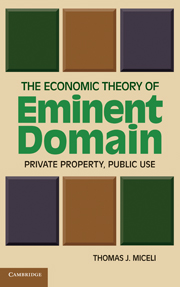Preface
Published online by Cambridge University Press: 05 June 2012
Summary
The Fifth Amendment of the U.S. Constitution gives the government the power to take private property for public use as long as it pays the owner just compensation. Though never popular, the government's exercise of this power for the purpose of constructing highways, hospitals, or other truly public projects is generally unquestioned. The recent case of Kelo v. New London (2005), however, pushed the limits of what constitutes an acceptable public use. In that case, the city sought to use eminent domain to acquire several private residences and small businesses in order to clear the way for a redevelopment project whose primary beneficiary was a large pharmaceutical company. In a 5–4 decision, the U.S. Supreme Court nevertheless upheld the city's right to take the property based on the enhanced tax revenues and new jobs that the project promised. The public outcry against this decision, and its apparent expansion of the government's power over private property, was loud and immediate, and was soon followed by political efforts in many states to curb the perceived abuse of eminent domain.
The Kelo case and its aftermath, however, was only the latest skirmish in the ongoing debate about the limits of eminent domain, pitting proponents of strong governmental powers to acquire or regulate property in the public interest on one side against private property rights advocates on the other.
- Type
- Chapter
- Information
- The Economic Theory of Eminent DomainPrivate Property, Public Use, pp. xi - xivPublisher: Cambridge University PressPrint publication year: 2011



